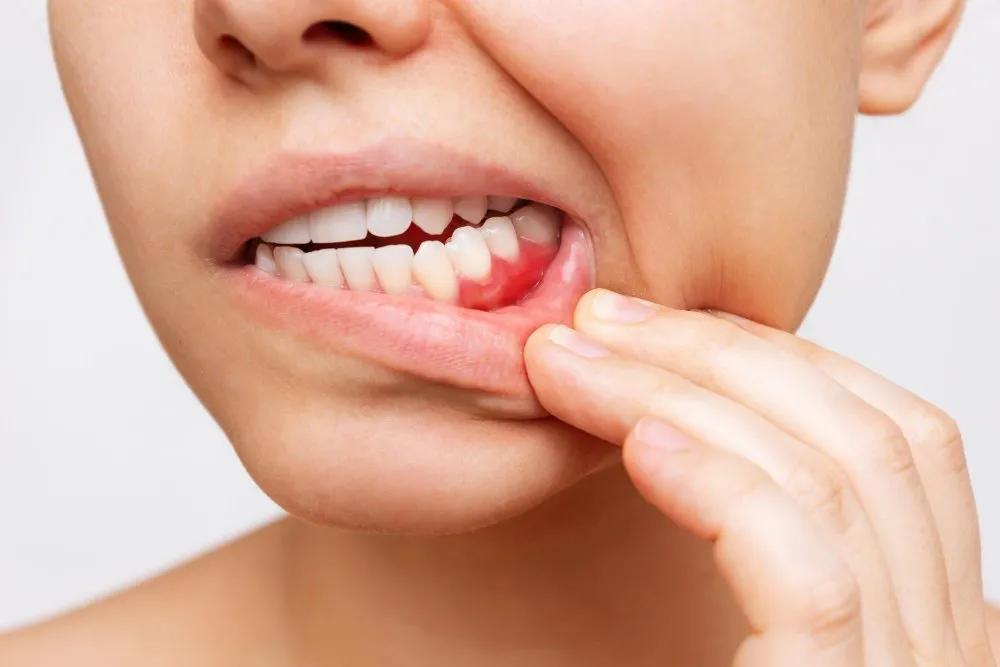
-
Posted By admin
-
-
Comments 0
Top Signs and Symptoms of Severe Gum Disease You Shouldn’t Ignore
Gum disease, medically known as periodontitis, doesn’t just threaten your smile it can wreak havoc on your overall health. Recognizing the symptoms of having gum diseases early could make all the difference, helping you avoid irreversible damage and costly treatments down the line. In this post, we decode the alarming symptoms you shouldn’t brush off.
What Is Severe Gum Disease?
Severe gum disease, or periodontitis, is a bacterial infection that attacks the gums and the bone supporting your teeth. If left untreated, it causes tissue loss, tooth loosening, and even systemic health issues due to inflammation and bacterial spread
Top Symptoms of having Gum Diseases
Here are the critical signs to watch for:
These symptoms of having gum diseases often creep up slowly. Early detection gives you a fighting chance before irreversible damage sets in.
Why Ignoring These Symptoms Is Risky
- Bone Loss & Tooth Loss
Over time, untreated gum disease destroys the jawbone, leading to loose teeth and eventual tooth loss - Systemic Health Impact
Oral bacteria can enter your bloodstream, exacerbating conditions like diabetes, heart disease, arthritis, and even impacting pregnancy outcomes . - Chronic Pain & Abscess Risk
Accumulated pus and infection causes ongoing discomfort and may spread to facial tissues
What To Do If You Notice These Symptoms
- Book a professional check‑up
Dentists use probes and X-rays to detect hidden disease and measure pocket depths . - Get deep cleaning (scaling & root planing)
Removes plaque and tartar buildup, smoothing root surfaces to reduce bacterial growth - Follow your dentist’s treatment plan
Professional cleanings, medications, and in severe cases, surgical intervention may be required - Maintain rigorous oral hygiene
Brush twice daily, floss daily, and schedule regular cleanings. Use interdental tools if needed - Address lifestyle and risk factors
Quit smoking, manage diabetes, and maintain balanced nutrition to support gum health
Early vs. Advanced Gum Disease: The Transition
- Stage 1 – Gingivitis
Symptoms: bleeding, mild redness/swelling. Reversible with good care - Stage 2 – Mild to Moderate Periodontitis
Signs: deeper pockets, early bone loss, increased redness - Stage 3 – Severe Periodontitis
Signs: gum recession, pus, loose teeth, pain, changes in bite
Early gingivitis is easy to reverse. Severe gum disease, however, demands professional care and may require surgery—so don’t wait.
Prevention: Your Best Defense
- Brush at least twice daily using a proper technique (including under the gumline) .
- Floss or use interdental brushes daily to eliminate hidden plaque.
- Visit your dentist regularly at least annually, more if you’re high-risk .
- Tackle lifestyle risks: stop smoking, manage systemic health issues, and eat a nutritious diet.
When to Seek Help Immediately
- Severe pain, pus, or swelling indicates an urgent problem.
- Noticeable gum recession, loose teeth, or implants/dentures no longer fit well.
- These are red flags signaling advanced gum disease. Prompt dental care is vital.
Trust Amtek Medical for Expert Dental Care in Ajman
At Amtek Medical, our dedicated team specializes in advanced periodontal care, helping you identify, treat, and prevent serious gum conditions. If you’ve noticed any symptoms of having gum diseases, don’t wait reach out today. While you’re browsing our services, consider these complementary options:
- Need a repair? Check out our best tooth filling in ajman services to maintain overall oral health.
Final Takeaways
Watching for symptoms of having gum diseases can save your smile—and your health. From early bleeding to advanced pus and bone loss, these warning signs demand action. Maintaining disciplined oral hygiene, routine dental check-ups, and confronting lifestyle risk factors are your strongest defenses. If in doubt, contact Amtek Medical—we’re ready to guide you toward a healthier, brighter future.
Stay informed. Stay proactive. Keep smiling.
🦷 Frequently Asked Questions (FAQs)
1. What are the first warning signs of severe gum disease?
The earliest indicators often include bleeding gums during brushing or flossing, persistent bad breath, and gum sensitivity. As the disease progresses, symptoms of having gum diseases like receding gums, pus discharge, and loose teeth may emerge.
2. Can gum disease go away on its own?
While early-stage gum disease (gingivitis) can be reversed with improved oral hygiene, advanced periodontitis requires professional dental treatment. Ignoring it can lead to permanent damage, tooth loss, and other health complications.
3. How is severe gum disease treated?
Treatment varies based on severity. It may include scaling and root planing (deep cleaning), antibiotics, laser therapy, or gum surgery. In cases involving decay, related treatments such as a tooth filling may also be necessary.
4. Is gum disease linked to other health problems?
Yes. Research has linked gum disease to serious health conditions like heart disease, diabetes, respiratory infections, and pregnancy complications. The inflammation caused by periodontal bacteria can affect your entire body.
5. How can I prevent severe gum disease?
Brush twice daily, floss daily, use mouthwash, and see your dentist regularly especially if you have risk factors like smoking or diabetes. Early detection of the symptoms of having gum diseases is the best way to avoid complications.


